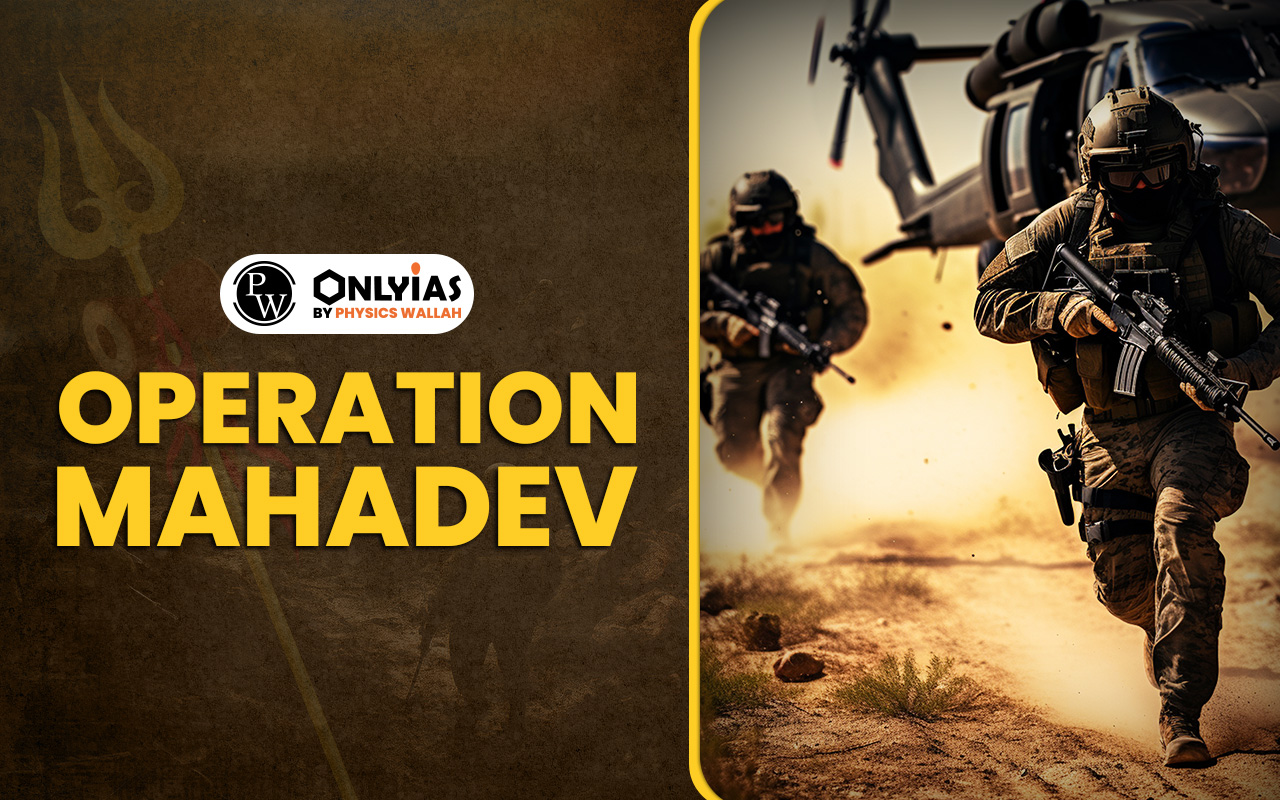Operation Mahadev was a 14-day counter-terror mission by Indian forces in Jammu & Kashmir that ended on July 28, 2025, with the killing of three terrorists, including Pahalgam attack mastermind Suleman Shah. The operation, named after Mahadev Peak near Srinagar, dismantled a key Lashkar-e-Taiba cell and exposed links to Pakistan-backed terror networks.

Operation Mahadev in Jammu and Kashmir was a 14-day-long counter-terror operation conducted by the Indian Army, CRPF, and J&K Police. It ended on July 28, 2025, with the killing of three terrorists, including Suleman Shah alias Hashim Musa, the mastermind behind the Pahalgam attack.
The operation was named after Mahadev Peak, a high-altitude region near Srinagar, where the terrorists were hiding deep in the forest. Security forces had been watching the area closely using advanced electronic surveillance and intelligence networks.
Operation Mahadev was launched when security forces picked up encrypted radio communication through Chinese ultra-radio equipment. These were traced back to Chinese ultra-high-frequency radios, which are used by Pakistan-backed terror groups like Lashkar-e-Taiba (LeT) and Jaish-e-Mohammed (JeM). These secure signals hinted at possible terrorist movement in the Mahadev Peak region.
Security forces continued monitoring the area for nearly two weeks. After two weeks, they confirmed that there were terrorists. After confirming their location and ensuring civilian safety, the forces carried out a precise and coordinated attack on 28th July, 2025.
The forces picked up suspicious signals from Chinese ultra-high-frequency radios, i.e., devices used by terror groups like Lashkar-e-Taiba and Jaish-e-Mohammed to communicate secretly.
After confirming movement near the peak, the army decided to strike. For two full weeks, the teams quietly tracked the terrorists’ location. Once they were sure, a well-coordinated mission was launched, and all three were neutralised in a single operation.
The operation was named Operation Mahadev after the Mahadev Peak, a high-altitude forested area near Srinagar, where the terrorists were hiding. This region served as their base camp and was considered extremely difficult to navigate due to its dense terrain and altitude.
By naming the mission after the peak, security forces directly linked the operation to the geography of the threat. It also reflected the forces’ understanding of the local terrain while carrying out the mission.
Three terrorists were killed during the operation, one was Suleman Shah, also known by the alias Hashim Musa. He was a senior commander of Lashkar-e-Taiba and the mastermind behind the Pahalgam terror attack of April 2025.
Alongside him, two other terrorists, Afghan and Jibran were also killed. All three had direct links to Pakistan’s intelligence agency ISI, and were in frequent contact with Lashkar handlers like Sajjad and Qazi Saif.
In his address to the Lok Sabha today, Union Minister Amit Shah stated:
“Suleiman was the mastermind, and the two others’ names were Afghan and Jibran. These were all top terrorists belonging to the Pak-based proscribed group Lashkar-e-Taiba”.
The Pahalgam attack took place on 22 April, 2025 in Baisaran Valley near Pahalgam, Kashmir in which the terrorists killed 26 people, including 25 Indian tourists and 1 Nepali citizen.
The attackers stopped groups of people, asked about their religion, and shot those who were not Muslims. Some were told to recite Islamic prayers and if they couldn’t, they were killed on the spot.
It was later found that the attack was planned and executed by Suleman Shah, the same terrorist who was killed in Operation Mahadev. He had received direct orders from ISI and Lashkar handlers to carry out this strike.
The planning for Operation Mahadev in Jammu and Kashmir began well before the final strike. After detecting the suspicious radio activity, security forces began keeping a close watch on the region using electronic surveillance equipment. The terrain around Mahadev Peak made it difficult for large operations, so the forces had to be patient and extremely cautious.
For 14 days, movement patterns of the terrorists were studied. When the time was right, a team of well-trained personnel moved into the area quietly. The terrorists were neutralized with minimal damage, and without causing harm to any civilians. The forces also recovered weapons, encrypted radios, and other communication devices from the site.
Operation Mahadev in Jammu and Kashmir wasn’t just another counter-terror mission. It was a targeted, intelligence-led operation that delivered justice for the Pahalgam attack victims. It also sent a strong message that India’s counter-terror response is precise, timely, and uncompromising.
It also helped dismantle a major Lashkar network operating in the Kashmir Valley, and exposed the direct involvement of Pakistan-backed handlers. More importantly, the operation was carried out without harming any civilians, despite the difficult location and high risk. It also disrupted the communication and training networks of terror groups operating in the region.
Ready to boost your UPSC 2026 preparation? Join PW’s UPSC online courses today!
Operation Mahadev Jammu and Kashmir is a 14-day counter-terror operation conducted by Indian security forces in Jammu and Kashmir. It led to the killing of three terrorists, including the mastermind of the Pahalgam attack.
The operation was named after the Mahadev Peak in Srinagar, where the terrorists were hiding in dense forest terrain.
Suleman Shah, also known as Hashim Musa, was the terrorist behind the Pahalgam attack. He was killed during Operation Mahadev.
The operation began after security forces intercepted encrypted radio communication from Chinese devices used by terrorists.
Three terrorists were killed, including the mastermind of the Pahalgam attack. No civilians were harmed, and encrypted communication tools were recovered.
<div class="new-fform">
</div>